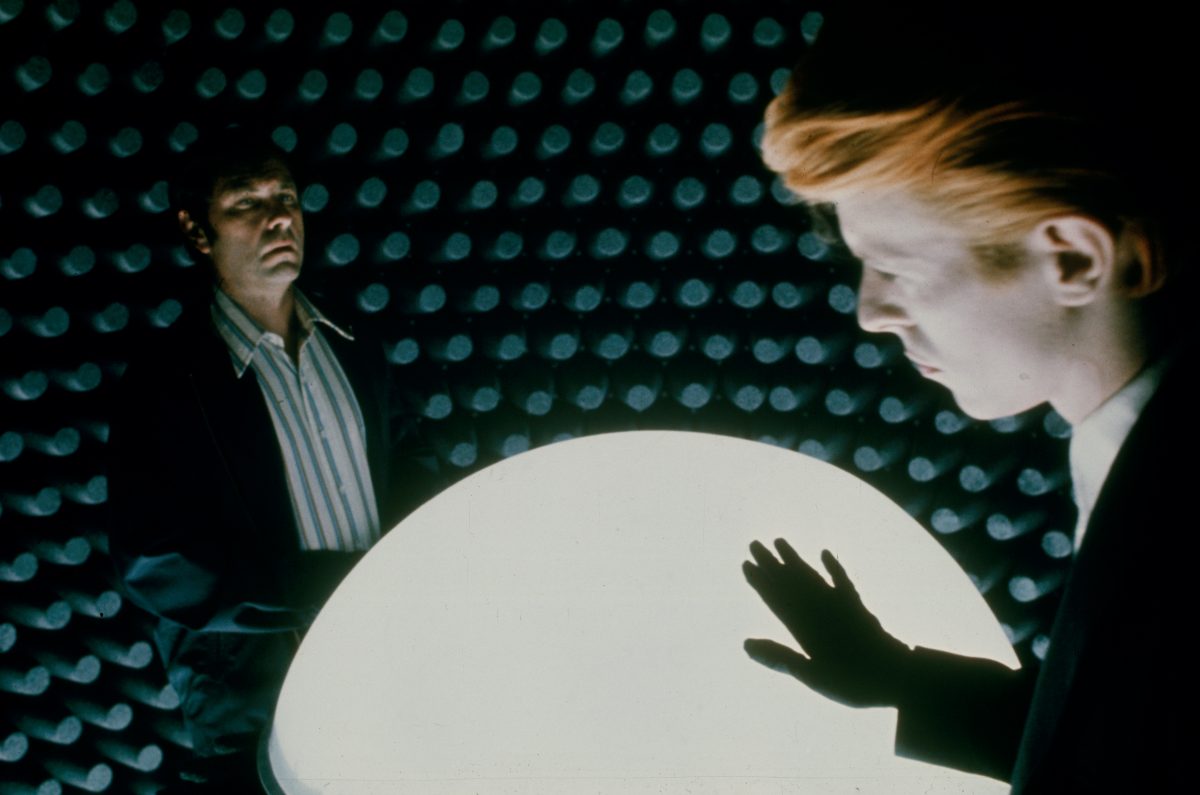The Man Who Fell To Earth

Nicolas Roeg
UK – 1976

Screenplay: Paul Mayersberg
Cinematography: Anthony B. Richmond
Production: British Lion Film Corporation Cinema 5
Language: English
Duration: 140 min
Color: Color
Synopsis: A humanoid alien is in search of water for his dying planet. When his spacecraft crashes on Earth, he adopts the name Thomas Jerome Newton and sets about finding a means of returning to his own planet. He quickly establishes a company specializing in state-of-the-art technology and his stocks begin to rize quickly. While his home is a vast arid world where water is scarce, Newton is getting to be quite wealthy on Earth and meets a girl, Mary-Lou, who falls in love with him. With the help of patent lawyer, Oliver Farnsworth, things are looking as if Newton might be able to afford to build himself a new spacecraft and to return home, but he does not realize to what extent the greed and ruthlessness of business here on Earth will frustrate his plans.
Notes: At the mention of Roeg’s name, a flood of indelible images springs to mind: the half-glimpsed figure in the red coat reflected in the waters of a Venice canal reminding reluctant psychic Donald Sutherland of his drowned daughter in Don’t Look Now (1973); David Bowie removing his contact lenses to reveal alien eyes, thereby scaring his playmate Candy Clark out of her mind in The Man Who Fell to Earth (1976); lost schoolgirl Jenny Agutter’s naked swim in the outback – an abiding memory for an entire generation of then adolescent straight boys – in Walkabout (1970) and in Performance (1970), James Fox’s gangster in a hippie wig under the influence of magic mushrooms being teased and taunted by Mick Jagger and Anita Pallenberg as they deconstruct his machismo. The neo-romantic side of Nicolas Roeg graced screens throughout the 1970s and early ‘80s and impressed British film critics who had begun to worry that the American wave of the ‘movie brats’, along with Hollywood’s aggressive co-opting of British filmmakers and actors, would drain the talent pool.
But there is another, political side to Roeg, every bit as potent. The Man Who Fell to Earth portrays a decade in which everyone is compromised and in which a cabal of corporate and governmental interests takes repressive measures—including extra-judicial killing and spying—to ensure control of potentially disruptive forces. Assassins resembling Nixon’s plumbers don motorbike helmets before murdering a competitor, Newton’s lawyer Oliver Farnsworth. In their sparkly helmets—worn to keep their faces clear of scratches or splatter from their victims—they resemble both spacemen and psychedelic secret police. The government has been assimilated to the status of a gigantic corporation bent on “determining the social ecology—this is modern America and we’re going to keep it that way.” Roeg strolls with Newton into a quintessential bad trip—the interstellar journey of the ultimate flâneur—taking in what Hunter S. Thompson in Fear and Loathing in Los Vegas (1972) would call the “bad craziness” of American landscapes and politics. Mary-Lou’s nervous summary of her home as “an unhealthy place,” and Newton’s reply—“I think it just takes getting used to”—both feel apt to the entire tone of the picture. In Andrei Tarkovsky’s 1972 Solaris, the alien being created to resemble the protagonist’s wife claims that “I am becoming a human being.” In The Man Who Fell to Earth, something resembling this sentence is recast as a nightmare of assimilation—in a paradoxical process involving the dehumanization of an alien.
This Memory! screening is a tribute to David Bowie (1947-2016), an all-around entertainer whose protean personality was perfectly fitted to Roeg’s film. A supermodel before the era of supermodels, Bowie’s extraordinary left eye, green with a dilated pupil, was for his fans a sign of his extraterrestrial origins. Endlessly manipulating his public identity, Bowie was rumored a visitor from outer space, a rumor which he did not discourage. His outlandish political views of pluralist fascism and penchant for controversy complemented the construction of his alien public persona. “I am an actor,” he said. “My whole professional life is an act.”
Notes drawn from James, Nick. “The Last British Romantic.” Sight & Sound 21, no. 3 (March 2011): 28-30. and Tyree, J.M. “Information managers: The Andromeda Strain and the Man Who Fell to Earth.” Film Quarterly 65, no. 4 (June 1, 2012): 43-47.


